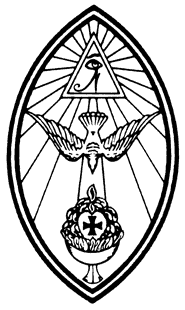Membership in OTO

Membership in O.T.O. is private in the sense that names and addresses of its members are not released to anyone, including O.T.O. officers lacking a need to know, without prior express or implied consent of the individual members concerned. Private information remains private.
Categories Membership
Membership with O.T.O. is divided into two primary categories: ecclesiastical lay membership and initiate membership.
- Ecclesiastical lay membership in the Ecclesia Gnostica Catholica (E.G.C.) is conferred by the ceremony of confirmation, which must be preceded by the ceremony of baptism. Lay membership conveys no authority or special privileges within E.G.C. or O..O. and may be conferred upon initiates and non-initiates alike.
- Initiate membership in Ordo Templi Orientis can be conferred only in a physical ceremony by a properly Chartered Initiator and is typically arranged through a local OTO body. A listing of all U.S. O.T.O. bodies is provided on the U.S. Grand Lodge Homepage and can be accessed at: .
Initiate membership is subdivided by degree.
- The Minerval Degree (0°) is an introductory Initiate Degree, designed to allow the aspirant to determine whether or not to become a full member. Members of the Minerval Degree may also begin novitiate training for the Diaconate and/or Priesthood in Ecclesia Gnostica Catholica.
- The First Degree (I°) bestows full membership upon the Initiate. A First Degree Initiate may retire from active participation in O.T.O., but the spiritual link forged between the Initiate and the Order during the ceremony of the First Degree will remain throughout the Initiate’s life.
An Initiate of the Second Degree (I°) is eligible for Ordination as a Deacon of Ecclesia Gnostica Catholica.
The E.G.C. is a Thelemic religious environment, dedicated to the advancement of Light, Life, Love, and Liberty through alignment with the Law of Thelma. The central activity of the E.G.C. is the celebration of Liber XV: The Gnostic Mass. Membership in E.G.C. is available through Baptism, Confirmation, and (after a period of training) Ordination. Many O.T.O. local bodies celebrate the Gnostic Mass on a regular basis, and in most locations, no formal affiliation is required to attend the Mass.
- Beyond the Degree of P. I. (Perfect Initiate) advancement is by invitation only. Initiates of the intermediate degree of Knight of the East and West (K. E. W.) are eligible for formal Ordination to the Priesthood in Ecclesia Gnostica Catholica. Episcopal consecration in Ecclesia Gnostica Catholica is conferred as part of the Seventh Degree. The Tenth Degree (X°) is held by the National Grand Master General of O. T.O. within a particular country.
Progress of the O.T.O. initiate toward the Fourth and P..I. degrees is usually a matter of years. A certain amount of time is usually required to allow full maturation of the effects of the O.T.O. initiations, although the Minerval and First Degrees may be taken on the same occasion in most locations if the candidate so wills and meets certain established criteria. Speak with a local body Officer if you have questions in this regard.
Every man and woman of full age (18 or more years old for Minerval, 21 for II*°), free, and of good report, has an indefeasible right to the first three degrees of O.T.O. These “first three degrees” actually include all the degrees in the Man of Earth Triad (the Minerval is considered a prologue to the First Degree, and the Fourth and P. I. Degrees are considered pendants to the Third Degree.
In addition to the official O.T.O. instruction provided by the ceremonial initiations, many local O.T.O. Lodges, Oases, and Camps offer supplementary instruction to their members; and to a lesser extent, to the general public. The particular form of this supplementary instruction depends on the character and capabilities of the particular local body; it may be provided in the form of classes, seminars, study programs, or publications.
It should be clearly stated that O.T.O. membership does not, of itself, confer any status in Freemasonry.
Nearly one hundred years ago, when O.T.O. was established in Europe, it was closely allied to several rites of European Freemasonry. However, in October of 1918, owing to the unique religious teachings of O.T.O., Aleister Crowley determined it appropriate for O.T.O. to sever all Masonic ties and formally renounce any claim to “make Masons.” At that time, while retaining the use of certain convenient customs and terminology used in early Freemasonry, Crowley revised the O.T.O. rituals, insignia, and modes of recognition to avoid infringing upon the legitimate privileges of the established and recognized authorities of modern Freemasonry. Further revisions along similar lines have been implemented in more recent years.
Despite some similarities between names and titles used within O.T.O. and the names and titles used in Masonry, various churches, and other organizations, conferral of any degree, rank, office, or status within O.T.O. does not constitute conferral of any degree, rank, office, or status in any other active organization, Masonic, religious, or otherwise; any more than status as the captain of a ship equates to status as the captain of a football team.